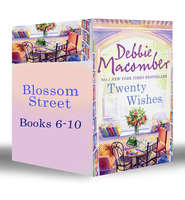По всем вопросам обращайтесь на: info@litportal.ru
(©) 2003-2025.
✖
Summer in Orchard Valley: Valerie / Stephanie / Norah
Автор
Год написания книги
2018
Настройки чтения
Размер шрифта
Высота строк
Поля
“Of course. I’ll be happy to.” Thoughtfully, Valerie watched him walk away. Charles not only edited the Clarion, he wrote a regular column and most of the major features, like the farm labor story he’d just mentioned. Considering his talent and energy, she was surprised he’d stayed on with a small-town paper; he could have gone to work for one of the big dailies long before now. But then, these days, with major newspapers folding, maybe he’d been smart not to leave.
She found it interesting that he’d asked about Steffie. Several years ago, Valerie had suspected there was something romantic developing between them. Steffie had been a college student at the time and Charles had just moved to Orchard Valley. She remembered Steffie poring over every article, every column, exclaiming over Charles’s skill, his style, his wit. To Valerie, it had definitely sounded like romance in the making. His comments about Stephanie now suggested it hadn’t been entirely one-sided, either.
But then, romance was hardly a subject she knew much about. So if there was something between Steffie and Charles, it was their business and she was staying out of it. She knew just enough about relationships to make a mess of them. A good example of that was how she’d bungled things with Colby.
She felt a twinge of regret. Since their kiss, he’d been avoiding her. Or at least she assumed he was. Until then, he’d made a point of coming by and chatting with her when he could. They’d always been brief visits, but their times together had broken up the monotony of the long hours she’d spent at the hospital. She hadn’t realized how much those short interludes meant to her until they stopped.
Norah was the one who’d sent Valerie on the errand into town. Some flimsy excuse about picking up some photos from a roll of film their father had left for developing. He was admittedly old-fashioned when it came to cameras and photography; Valerie had wanted to buy him a digital camera last Christmas but he’d insisted that he preferred his forty-year-old Nikon, which had served him well all these years. Asking her to collect the pictures now was a blatant attempt to get her out of the hospital, not that Valerie minded. She was beginning to feel desperate for fresh air and sunshine.
Although most of the orchards were miles out of town, she could’ve sworn that when she inhaled deeply she caught a whiff of apple blossoms.
Spring was her favorite time of year. But although she’d been home intermittently over the past decade, she’d never spent more than a day or two and had never visited during April or May. She wondered if she’d been unconsciously avoiding Orchard Valley during those months, knowing that the charm and the appeal of her home would be at their strongest then. Perhaps she’d feared she might never want to leave if she came while the white and pink blossoms perfumed the air.
Not wanting to examine her thoughts too closely, Valerie continued down the street, past the feed store and the local café until she arrived at her destination. Al’s Pharmacy.
Al’s was a typical small-town drugstore, where you could buy anything from cards and gifts to aspirin and strawberry jam. At one end of the pharmacy Al operated a state-run liquor store and in the opposite corner was a small post office. The soda fountain, which specialized in chocolate malts, was situated at the front. It had been there since the fifties, the kind of thing rarely seen outside of small towns anymore. Valerie had lost count of the number of times she’d stopped in after school with her friends. She wondered if “going to Al’s for a chocolate malt” remained as popular with local teenagers these days as it had been when she was growing up. She suspected it did.
“Valerie Bloomfield,” the aging pharmacist called to her from behind the counter. “I thought that was you. How’s your dad doing?”
“The same.”
“Norah phoned and said you were on your way. I put those snapshots aside for you and just wrote it up on the bill. You tell your dad I’m counting on him to go fishing with me come July, and I won’t take no for an answer.”
“I’ll tell him,” Valerie promised.
She took the package and wandered outside. Curiosity got the better of her, though, and she paused on the sidewalk to open the envelope. Inside was an array of snapshots her father had taken that spring.
Valerie’s heart constricted at the number of photos he had of her mother’s grave site. In each, a profusion of flowers adorned the headstone. There were a couple of pictures of Norah, as well. The first showed her sitting in a chair by the fireplace, a plaid blanket around her knees and an open book on her lap. The second was taken outside, probably in late March. The wind had whipped Norah’s blond hair about her face, and she was laughing into the sun. In both photographs her resemblance to their mother was uncanny.
Grief and pity tore at Valerie’s heart as she imagined her father taking those pictures. He was so lost and lonely without his Grace, and the photographs told her that in an unmistakable and poignant way.
Her thoughts oppressive, Valerie walked aimlessly for a few minutes. When she saw that she was near the community park, she strolled in, past the swimming pool, now drained and empty, and followed the stone walkway that meandered through the manicured lawns. As she reached the children’s playground, a breeze caught the swings, rocking them back and forth.
Memories of her childhood crowded her mind, and she sat in one of the old swings, almost wishing she could be a little girl again. It would’ve been easy to close her eyes, pretending she was eight years old. She allowed herself a minute to remember Sunday afternoons spent in this very park, with David pushing her and a tiny Stephanie on these swings, catching them at the bottom of the slide. But she was thirty-one now and her father, whom she adored, was in a hospital room, fighting for each breath he drew.
She refused to even consider the possibility of losing him. Was she being selfish? She didn’t know. Her father had said he was ready to die, ready to relinquish his life.
She dragged the toe of her shoe along the ground, slowing the swing to a halt. When the time came to let go of her father, Valerie prayed she could do it with acceptance and strength. When death came to him, she wanted it to be as a friend, not an enemy with a score to settle. But don’t let him die yet. Please, not yet.
As she drove back to the hospital, past the strip malls that marked the highway, she caught sight of a recent addition. A movie theater, a six-plex. It astonished her that little Orchard Valley could have six movies all playing at once, especially in the era of DVDs and movies you could download from the Internet. She supposed that in a small town, going to the movies was still a major social event. The downtown theater she remembered so well from her teenage years still operated, but to a limited audience; according to Norah the features were second-run and often second-rate.
Orchard Valley had its share of national fast-food restaurants now, too, many of them situated along the highway. But as far as Valerie was concerned, hamburgers didn’t get any better than those at The Burger Shack, a locally owned diner.
The summer she was sixteen, Valerie had worked there as a waitress, serving customers for minimum wage, thinking she was the luckiest girl in town to have landed such a wonderful job. How times had changed! How much she’d changed.
As she neared the hospital, Valerie felt a surge of reluctance. For nearly a week now, she’d practically lived on the CCU floor with only brief visits home to shower and change clothes. It had been a strange week, outside ordinary time somehow. Four years ago, when her mother was dying, she’d experienced something similar. But then her father and both her sisters had been there to share it. Now there were only two—Norah and her. And Colby …
She pulled into the parking lot and found a vacant spot, then walked toward the main entrance, sorry to leave the sunshine.
The minute she entered the lobby, Norah sprang up from the sofa she’d been sitting on. “I didn’t think you’d ever get back,” she said breathlessly. “What took you so long?”
“I stopped at the park. What’s the matter?”
“Steffie called from Rome. She’s flying home by way of Tokyo. I know it sounds crazy, but it was the most direct flight she could get. She’s hoping to arrive sometime tomorrow night. She wasn’t sure exactly when, but she said she’d let us know as soon as possible.”
“How’d she make it to Rome?”
“I asked her that, but she didn’t have time to explain. I told Dad she’d probably be here by tomorrow night.”
Valerie felt herself relax. Until now, she hadn’t realized just how tense she’d been over Steffie’s situation.
“Colby wants to see you,” Norah informed her next.
“Did he say why?”
Norah shook her head, frowning a little. “You two didn’t have an argument, did you?”
“No. What makes you ask?”
Norah shrugged vaguely. “Just the way he looked when he asked for you.”
“Looked?”
“Oh, I don’t know.” Norah was clearly regretting that she’d said anything. “It’s like he was eager to see you, but then relieved when I told him you’d gone into town. That might seem absurd, but I can’t think of any other way of describing it.”
“I’ll catch him later.” For some reason, Valerie wasn’t quite ready to see him yet.
“I’m sure he’ll stop by this evening.”
“How’s Dad doing?” Valerie asked as they headed for the elevator.
“Not so good. His breathing is more labored and the swelling in his extremities isn’t any better. That’s not a good sign. Colby’s doing everything he can to drain his lungs, but nothing seems to work. In the meantime, Dad’s growing weaker by the hour.”
“He misses Mom even more than we knew,” Valerie whispered, thinking about the snapshots she’d picked up at Al’s Pharmacy. She wondered how often he’d visited their mother’s grave. How often he turned to speak to the woman he’d spent a lifetime with, remembering too late that she was gone.
“What will we do if anything happens to Dad?” Norah asked quietly.
A few days earlier, Valerie would’ve rejected that possibility, adamantly claiming their father wasn’t going to die. She’d stubbornly refused to consider it. She wasn’t as unyielding now.
“I don’t know,” she admitted, “but we’ll manage. We’ll have to.”
They were seated in the waiting room when Colby arrived. Valerie glanced up from a business publication she was reading and knew instantly that something was wrong. Terribly wrong. His eyes, dark and troubled, met hers. Without being conscious of it, she stood, the magazine slipping unnoticed to the floor.
“Colby?” His name became an urgent plea. “What is it?”
He sat down on the sofa and reached for Valerie’s hands, gripping them tightly with his own. His gaze slid from her to Norah. “Your father’s suffered a second heart attack.”
“No,” Norah breathed.











